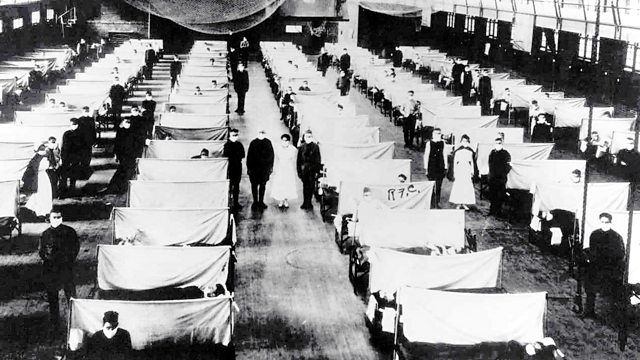Episode 3 - The long-term impact
Leading virologist Professor John Oxford charts the story of the 1918-19 flu pandemic which killed more than 220,000 people in the UK and over 50 million people worldwide.
Leading virologist Professor John Oxford presents a three part series on the origin, spread and reaction to the Pandemic that devastated much of the planet just over 100 years ago.
The so-called Spanish flu of 1918/19 is estimated to have killed more than 50 million of the 500 million people it infected, including 228,000 in the UK. It was the planet's biggest single natural human catastrophe - a flu pandemic that killed more people than both world wars put together in a fraction of the time. And yet this huge moment in history remains largely under the radar.
In three programmes, he charts the story of how the 1918/19 flu pandemic affected the UK and the world.
In Episode 3, he looks at the long-term impact of the flu on health, communities, the economy and governments.
Britain and much of the world was never the same again. Whole generations and communities were wiped out - 900,000 orphans were created in just four weeks in one part of Africa, while some people never recovered from the long-lasting impact of having the flu. Many remained desperately weak and died long before their time. Others developed Encephalitis Lethargica, which put 5 million people worldwide into a long term coma.
And the events of 1918/19 changed dramatically the way different countries saw health provision. New Zealand was quick off the mark with huge changes almost immediately, while the devastating experiences of 1918/19 in the UK would lead eventually to the development of the National Health Service.
The economy wasn't helped by the killer flu. The war, political uncertainty in Ireland and the aftermath of the Russian Revolution created a perfect storm. Many businesses around before the war would not return, and unemployment and poverty were rife in the early 1920s.
But it did lead to some early change in Britain around general health and well-being, with more focus on housing to deal with a huge overcrowding crisis, clean water supplies and access to other utilities.
The impact on mental health can't be underestimated. Depression was a huge fact of life for many in the post-flu period, and we hear testimony about loved ones who were never quite themselves again - some never wanting to discuss the flu, others having a severe continual sense of fear and insecurity that nothing was safe and that, one day, more people might be taken from them.
Produced by Ashley Byrne and Iain Mackness
A Made in Manchester production for Radio 4
Last on
More episodes
Next
You are at the last episode
Broadcasts
- Fri 29 May 2020 11:00Βι¶ΉΤΌΕΔ Radio 4
- Tue 30 Aug 2022 21:00Βι¶ΉΤΌΕΔ Radio 4
- Wed 31 Aug 2022 15:30Βι¶ΉΤΌΕΔ Radio 4

